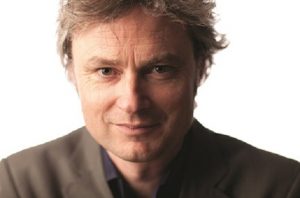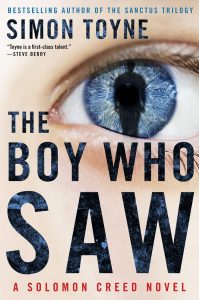Simon Toyne was a highly successful writer, director, and producer in British television. He worked on many award-winning shows. Now, he is a full-time novelist, whose first book, Sanctus, became part of an internationally bestselling trilogy. His second series features a mesmerizing character, Solomon Creed.
shows. Now, he is a full-time novelist, whose first book, Sanctus, became part of an internationally bestselling trilogy. His second series features a mesmerizing character, Solomon Creed.
In The Boy Who Saw, Solomon Creed is a mysterious hero who has no memory of who he is, or from where he came. The only clue to his identity is a label stitched inside his jacket saying: “This suit was made to measure for Mr. Solomon Creed.”
The jacket fits perfectly, but there is a second name on the label: the name of the tailor who made the suit and an address in Southern France.
Solomon heads to France in search of this man, hoping to discover more about his own identity. But instead of answers, he finds a bloody corpse with the Star of David carved into its chest and the words “Finishing what was begun” written in blood on the wall. Solomon continues his quest and finds himself amid a decades-old conspiracy that threatens his life and the well being of France.
It’s clear that The Boy Who Saw explores some dark themes based on some recent political events. Will you tell our readers what those events are and how they relate to the novel?
The central story revolves around a killer who has murdered a tailor and is trying to get the names of other people to kill. Along with the body of this tailor, the police discover a wall in his shop on which is written in blood, ‘Finishing what was begun.’ The ritualistic murder suggests it had something to do with the Nazi deathcamps. The victim, this tailor, was one of only four survivors from a specific death camp.
As the anniversary celebrating the end of the Second World War looms, someone is trying to complete the murders that began seventy years earlier. The novel is also set amidst the current political shift in both America and Europe—the turning toward hard, nationalistic right wing politics. The nationalists are looking for scapegoats, just as the Jews were scapegoated by Germany in World War II.
The entire story is really about the importance of remembering our history; otherwise, it will repeat itself. While it’s a thriller, with Solomon becoming a suspect who must escape and clear his name, it deals with modern themes and larger concerns set against the backdrop of a survivor’s memoir which ties it into what is happening today.
I like to explore a relevant theme through my writing, but I didn’t want to do so in a non-fiction format. I wanted it to be a dramatic rendering so it would be an exciting read that would still explore these larger themes and questions.
While it’s a true thriller, The Boy Who Saw, also deals with the beguiling mystery of memory, both on a grand scale and for an individual. Tell us more.
Memory is a theme that permeates all the Solomon Creed books. Solomon is a sort of genius in the sense that he knows virtually everything about anything. He has a Wikipedia-like mind. He knows history; he can speak many languages; but he can’t remember anything personal. His story, both in this book and in the rest of the series involves him being on a journey back to finding himself.
In this book, he’s in France because he’s wearing a beautifully tailored jacket with a note in the pocket saying it was made expressly for him. And in tiny stitching is the name and address of the tailor who is the person who was killed at the beginning of the book. Solomon knows he must have met the tailor, but of course, he has no recollection of it.
In the world-at-large, populism is rising at the same time the people who lived through the Second World War are dying off. So, I felt it was crucially important to tell this story lest we repeat our pasts.
The Boy Who Saw begins unravelling some of the mystery of Solomon Creed’s life. Do you intend to reveal more of it as the series progresses?
Yes. When I started writing these books, I knew who he was and what the ultimate revelation will be. I want each book to take place in a different location, with a distinct element of mystery, each addressing a specific moral dilemma or question. I want each volume in the series to solve a mystery, as Solomon goes through these experiences on his way to finding out historical bits about himself. By taking part in these difficult and dangerous experiences, he will learn more about himself. And of course, I want to take the reader on that same journey with Solomon.
It’s a gratifying challenge for me as writer to tell a satisfying story with a beginning, middle and ending in each book, but also with a thread running through it. It’s as though each book is a bead on a necklace.
There’s something mystical and mythological in your books. I’m reminded of the Myth of the Birth of the Hero by Otto Rank. Will you talk about the “myth” of Solomon Creed?
Even though the Solomon Creed books are modern thrillers, they have historic backstories, whether it’s The Searcher or The Boy Who Saw. And, though the books are thrillers, Solomon isn’t a stereotypical action hero. He’s somewhat ethereal. Typical action heroes have solid pasts—they’re ex-cops or ex-military who use their skillsets to solve crimes. With Solomon, the biggest mystery is himself. He lacks that centeredness. He has a mythological—nearly a supernatural—quality.
Yes, he bleeds and is mortal, but I wanted him to have a somewhat mythical dimension. And the novels raise the question—perhaps even the possibility—that he’s been reincarnated. There’s a tension and a question about the reality of Solomon, and he keeps cropping up in these historical contexts. I like playing with that possibility. As a reader, I enjoy characters who assume a quality of being slightly larger than life, someone who’s slightly other, or heroic. In fact, this Solomon Creed series is effectively, an odyssey of self-discovery.
You left a successful television career to begin writing your first novel. What motivated you to do so?
I was thirty-nine and perhaps it was a classic midlife crisis. I’d done everything I had wanted to do in TV. I always had this notion that I wanted to tell big stories. Approaching forty, I felt I was getting stale with my TV work, and told my wife I’d love to write a book and get it out of my system.
It would mean taking time off from my television job, which was all consuming. I didn’t want to write at night when I would be tired, and leave open the possibility of blaming any failure on fatigue. If I was going to fail, I wanted it to be an honest failure.
When I told my employer what I wanted to do, he offered me a one year sabbatical. That was certainly a sensible way to go, but I turned it down. I felt I had to remove the safety net and take on the dare for myself—without the security of knowing I could go back. I knew writing a novel would be very hard, and wanted to remove any possible temptation to give up and return to my old job.
We saved up some money. I quit my job; we rented out our flat, and went to live in France for six months. That’s how it started.
My first novel Sanctus was a hit and was translated into twenty-seven languages.
What, if anything, keeps you awake at night?
I’m a good sleeper. With three young children, I’m worn out at the end of the day. I do have fitful sleep when I’m about two-thirds of the way through a book. At that point, I know everything I’ve written needs a good deal of work, and there’s a deadline looming. I know I’ll have to tidy things up, and it feels like I’ve got this terribly heavy weight on my back. That’s also the point in the writing where I think the idea that I first thought was really good, suddenly seems like the worst idea anyone has ever had. [Laughter]. And, I still have to show up every day and finish this thing that’s fallen out of favor.
What’s coming next from Simon Toyne?
I’m well into Solomon Creed’s third book which is set in England.
Congratulations on penning The Boy Who Saw, a propulsive thriller with historical, philosophical, mythical, political and religious undertones, a novel that hooked me from the first page and propelled me to the vary last one.





Leave a Reply
You must be logged in to post a comment.